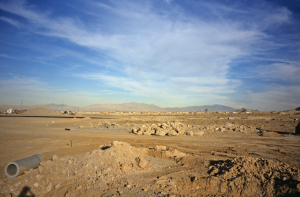A Brief History of Quid Pro Quo Wilderness
 Janine Blaeloch,
Janine Blaeloch,
Board member, Wilderness Watch
Director, Western Lands Project
Beginning in the late 1990s, a new kind of land deal materialized in Congress that would present a huge challenge to grassroots public land activists and wilderness advocates and create a significant schism in the environmental movement. Quid pro quo wilderness, as it came to be called, was carried forth in legislation that combined wilderness designation with exchanges, sales, even outright giveaways of public land designed to “buy” Wilderness. As the 40th anniversary of the Wilderness Act approached, controversy was roiling around this new strategy. As we approach the 50th, we need to remind ourselves of the threats posed to Wilderness and public land, and rededicate ourselves to the fundamental ideals and hopes we hold for them.
Traditionally, wilderness legislation simply designated the boundaries of newly-protected areas and might include “release” language that dropped Wilderness Study Areas from interim protection, and/or from any future consideration for Wilderness status. Quid pro quo wilderness, promoted by big-name, big-money organizations like the Wilderness Society, Campaign for America’s Wilderness, and the Sierra Club, turned this simple tradition of wilderness protection on its head.
Suddenly, staff time was spent not in gathering public support for Wilderness and campaigning for passage of concise, protective bills, but in negotiations with anti-wilderness “stakeholders”—ranchers, local politicians, developers, and motorized recreation enthusiasts. Wilderness designation came to be but one provision in sometimes voluminous legislation that also privatized public land, facilitated major water and land development projects and allowed non-conforming, wilderness-damaging uses in the newly designated wilderness lands.
 100,000 acres of public lowland habitat near Steens Mountain were traded to ranchers in the first big quid pro quo deal. Photo: Western Lands Project On Oregon’s Steens Mountain, environmental groups negotiated a deal that traded more than 100,000 acres of federal land to ranchers in order to get 18,000 acres that would go into a new Wilderness. In Nevada, wilderness advocates supported the privatization of tens of thousands of acres of public land in Clark, Lincoln, and White Pine counties. In Idaho, two huge quid pro quo bills proposed to give federal land away to local government—including in the beloved Sawtooth NRA--and to force land exchanges with ranchers who would be allowed to name the value of their land.
100,000 acres of public lowland habitat near Steens Mountain were traded to ranchers in the first big quid pro quo deal. Photo: Western Lands Project On Oregon’s Steens Mountain, environmental groups negotiated a deal that traded more than 100,000 acres of federal land to ranchers in order to get 18,000 acres that would go into a new Wilderness. In Nevada, wilderness advocates supported the privatization of tens of thousands of acres of public land in Clark, Lincoln, and White Pine counties. In Idaho, two huge quid pro quo bills proposed to give federal land away to local government—including in the beloved Sawtooth NRA--and to force land exchanges with ranchers who would be allowed to name the value of their land.Well-staffed groups with lavish funding—much of it provided by the Pew Charitable Trusts-- engaged in complex, closed-door negotiations with members of Congress, county commissioners, and others who sought to extract a heavy price for allowing wilderness designation to advance. In the meantime, grassroots groups working to uphold the sanctity of Wilderness and the integrity of public lands had a huge task on our hands. In addition to lobbying Congress and explaining the pitfalls of quid pro quo to the public, we had to try to change the trajectory of organizations that had at times been allies.
 Quid pro quo deals have pushed pavement and development farther out into the magnificent desert of the Las Vegas Valley. Photo: Western Lands Project In our view, quid pro quo wilderness proposals that sanctioned land disposals and developments had grave potential to undermine environmentalists’ efforts to protect and retain federal lands and to secure real Wilderness protection. In promoting these actions, wilderness negotiators were legitimizing the view of anti-public land politicians and other interests who regarded federal land as a low-value, disposable asset, and Wilderness as a prize that could be won only through damaging, far-reaching concessions.
Quid pro quo deals have pushed pavement and development farther out into the magnificent desert of the Las Vegas Valley. Photo: Western Lands Project In our view, quid pro quo wilderness proposals that sanctioned land disposals and developments had grave potential to undermine environmentalists’ efforts to protect and retain federal lands and to secure real Wilderness protection. In promoting these actions, wilderness negotiators were legitimizing the view of anti-public land politicians and other interests who regarded federal land as a low-value, disposable asset, and Wilderness as a prize that could be won only through damaging, far-reaching concessions.By late 2006, as several quid pro quo bills we had managed to keep from passage stood in the end-of-session Congressional queue, Western Lands, Wilderness Watch, and Friends of the Clearwater composed an open letter to the conservation community calling for “a moratorium on damaging public land and wilderness legislation.” With the very real possibility that the House would be changing from a Republican to a Democratic majority in the coming election, and countless other reasons to abandon the quid pro quo approach, we urged proponents to back away from these bills. The letter was signed by 88 groups from across the country, and distributed to both Congressional offices and the deal-making groups.
As it happened, only one of the poisoned bills passed before Congress adjourned—a quid pro quo for White Pine County, Nevada sponsored by then-minority Senate Leader Harry Reid. Reid, an incorrigible public-land dealer had managed to attach it to a tax-relief bill.
We in the grassroots persisted in our battle against these bills and eventually gained the critical support of Jeff Bingaman (D-NM), Chair of the Senate Energy and Natural Resources committee, and Nick Rahall (D-WV), his counterpart in the House. Bills laden with giveaways and development projects were either buried or substantially re-written.
In 2009, the phalanx of quid pro quo bills that had prompted the moratorium call fell into disparate pieces. One Idaho bill passed after being gutted of its worst provisions. The same fate came to a Utah bill mandating the sell-off of 25,000 acres of public land for housing development. But these were not total victories—some bad provisions for Wilderness access and use remained in these bills, and scores of public-land related measures ended up passing in a 1,300-page omnibus bill, the worst of which opened the door for the State of Alaska to build a 15-mile-long road through across the Izembek Wilderness. This horrible, precedent-setting provision was described by Pew Trust’s wilderness program leader, Mike Matz as the “art of legislating. It’s about compromise.”
Since then, the national groups have bemoaned the lack of new wilderness designations and have pushed for another public-lands omnibus. Perhaps they realized that individual quid pro quo measures left them too exposed, and—as members of Congress have so often done—seek the cover of a big bill, where the bad gets passed with the good, and no one is the wiser. One can barely imagine what they might come up with in negotiations with the current crop of legislators, including a House full of public land-averse Republicans and Harry Reid heading up the Senate.
Janine Blaeloch is founder and director of the Seattle-based Western Lands Project, which monitors federal land exchanges, sales, giveaways, and any proposal that would privatize public lands. She has written three books on these issues, including “Carving Up the Commons: Congress and Our Public Lands.” Janine earned a degree in Environmental Studies from the University of Washington, with a self-designed program focusing on Public Lands Management and Policy. Before starting Western Lands, she worked as an environmental planner in both the private and public sectors. She has been an activist since 1985.
When you subscribe to the blog, we will send you an e-mail when there are new updates on the site so you wouldn't miss them.
Contact Us
Wilderness Watch
P.O. Box 9175
Missoula, MT 59807
P: 406.542.2048
Press Inquiries: 406.542.2048 x2
E: wild@wildernesswatch.org
Minneapolis, MN Office
2833 43rd Avenue South
Minneapolis, MN 55406
P: 612.201.9266
Moscow, ID Office
P.O. Box 9765
Moscow, ID 83843

Comments 1
a thorny issue to be sure, the public lands fight has become a free-for-all and many politicians lack the guts to see Wilderness bills through without giving something to everybody. Seeing the same thing here in Wyoming, our greaseball politicians won't move any bill forward unless everybody gets a piece of the pie.